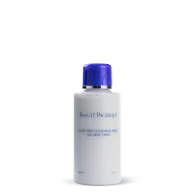Vitamin C in skin care
Energy boost for the skin with collagen and antioxidants
Many associate vitamin C as the number one remedy for fighting snot and runny noses, and vitamin C also has a big impact on your immune system and can reduce fatigue and exhaustion. But vitamin C can do much more than that.
Vitamin C positively affects your body in a number of ways!
Vitamin C increases collagen content
Collagen is a word that is on most people’s lips when talking about maintaining a youthful appearance, as collagen maintains firmness and elasticity of the skin. But what is collagen?
In short, collagen is a protein that helps build bones, cartilage, tendons, skin and more. Collagen maintains our connective tissue function, allowing it to ‘hold together’ the body and keep it strong and resilient. The connective tissue is the ‘glue’, you might say.
In our young years the body has a naturally high content of collagen in the body, but with age this amount will decrease and the connective tissue will weaken as a result. This can be seen in the skin becoming more lax and wrinkled, there may be cellulite on the thighs and the body loses its smoothness and elasticity. It can also show up as bones and joints starting to ‘crack’ or scrub when we move – the typical signs of age that tell us our bodies aren’t as strong as they used to be.
This is why collagen is important for the body, and this is where vitamin C comes in, because vitamin C goes directly to increasing the body’s collagen production and thus the connective tissue’s functionality. Vitamin C is therefore a source of increased collagen and thus also a source of anti-ageing.
What are free radicals?
Free radicals are unstable molecules that arise as a by-product of the enormous energy expenditure by the body’s cells. The body’s cells are always busy; busy fighting off foreign microorganisms, growing and dividing, renewing and rebuilding, and that requires a lot of energy, and the by-product of that process is free radicals.
It can be compared to exhaust gas from a car. The car burns fuel to run and, based on this combustion, it emits exhaust gas. Cells use a lot of energy to function optimally and from this process free radicals are released.
Free radicals have a negative impact on the body. They try to attach themselves to healthy substances in the body and if they succeed, the substance will oxidize – that is, it will lose its effect or be ‘reprogrammed’ in an inappropriate way, which can lead to cell changes.
What can antioxidants do?
And that is when the antioxidants from vitamin C come into play. Antioxidants go in and prevent the free radicals from attaching to the healthy substances in the body. Antioxidants simply neutralise the free radicals. In fact, you could say that antioxidants are to your body what Car Free Sunday is to the environment.
There will always be free radicals in the body, but we can do something to reduce them. On the other hand, there are some external aspects that increase the amount that we can reduce. It can be the sun’s rays, consumption of fatty food or alcohol, air pollution, cigarette smoke, infections in the body and the like, that put the cells into overtime, and we can be aware of adding antioxidants through diet and our care products.


The skin-enhancing properties of vitamin C
Vitamin C is therefore a bit of a miracle ingredient in your skin care, because it can:
- Strengthen skin by maintaining elasticity and firmness of connective tissue
- Protect the skin against external influences
- Fight sun damage, including pigment changes
- Provide a smoother surface on the skin
- Provide healthy and strong skin that has plenty of glow
We do not have natural levels of vitamin C in our bodies, so we need to get the vitamin either through our diet or skincare to benefit from its unique and super-boosting properties.
Our specialty is effective skin care products that strengthen the skin, so we will now take a look at them.




